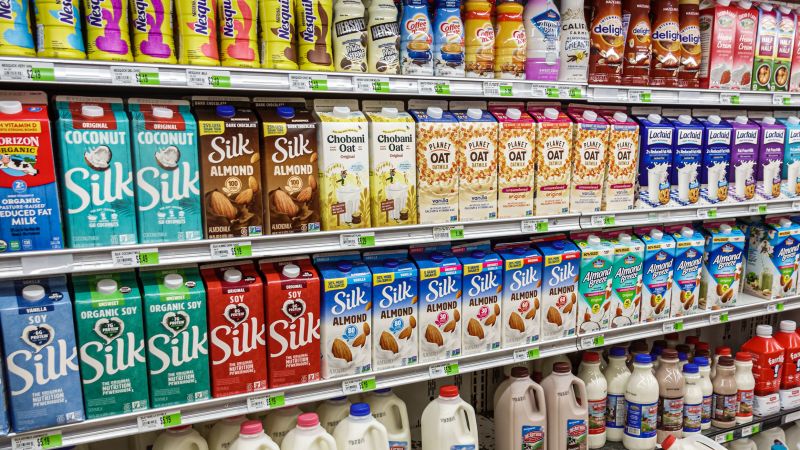
CNN
—
The plant-based milk you buy may soon have a revised label.
The US Food and Drug Administration issued draft guidance Wednesday on how companies should identify plant-based products that are marketed and sold as alternatives to dairy milk, such as almond, oat or soy milk.
Any plant-based milk product with the word “milk” in its name should include a statement explaining how the product compares with dairy milk, according to the draft guidance.
“Food labels are an important way to help support consumer behavior, so we encourage the use of the voluntary nutritional statements to better help customers make informed decisions,” Susan Mayne, director of the FDA’s Center for Food Safety and Applied Nutrition, said in a statement.
In the future, the label on alt-milks could state “contains lower amounts of vitamin D and calcium than milk” or “contains less protein than milk.”
But the guidance “assumes that cow milk is the superior standard. Might human milk not be a better standard?” inquired nutrition researcher Dr. Walter Willett, a professor of epidemiology and nutrition at Harvard T.H. Chan School of Public Health and professor of medicine at Harvard Medical School.
“The requirement for the same protein content as in cow milk is dubious, as protein intake has not been recognized as a critical issue for children,” he added. “If anything, the amount in human milk would be a reasonable standard.”
Humans are the only mammals that drink milk from another animal, noted Dr. David Katz, a specialist in preventive and lifestyle medicine and nutrition.
“Those of us who favor plant-based eating could well argue that preferred plant milks could be the standard, and bovine milk should have to declare how it differs from those,” he said.
“Given that … I think the FDA proposed guidance is excellent,” Katz said in an email. “It does make good sense if a product is designed and marked to ‘substitute for’ something, that it be compared directly to that ‘something,’” he said.
Move over soy, rice and almond milk. Grocery shelves now hold “cashew, coconut, flaxseed, hazelnut, hemp seed, macadamia nut, oat, pea, peanut, pecan, quinoa and walnut-based beverages,” the FDA said.
Consumers may not understand that these products are made from liquids extracted from such tree nuts, legumes, seeds or grains, and have a different makeup than traditional dairy milk.
“Getting enough of the nutrients in milk and fortified soy beverages is especially important to help children grow and develop, and parents and caregivers should know that many plant-based alternatives do not have the same nutrients as milk,” Mayne said.
In reality, some plant milks are likely to be superior to cow milk, according to Willett. Soy milk contains far more healthy essential fatty acids than does cow milk, he said, and there is evidence that eating soy phytoestrogens during adolescence may reduce the risk of breast cancer.
“Also, high consumption of cow milk in adolescence has been associated with higher risk fractures later in life, probably because drinking cow milk increases our blood levels of a hormone called ‘insulin-like growth factor,’” he added.
Willett is the coauthor of a 2020 review on the topic of milk and human health published in The New England Journal of Medicine. The review says that dairy milk did not prevent fractures, which is often used as a reason for providing milk to children and adults. Instead, the study found higher rates of hip fractures in nations that consumed the highest amounts of milk and calcium.
The proposed requirements for similar levels of vitamins D and A are reasonable, Willett said, but it’s important to point out that milk contains high levels of those vitamins because they are added.
Many plant milks are also fortified with vitamins, minerals, calcium and proteins, but it can be difficult to know exactly, experts said.
However, the draft recommendations “should lead to providing consumers with clear labeling to give them the information they need to make informed nutrition and purchasing decisions on the products they buy for themselves and their families,” FDA Commissioner Dr. Robert Califf said in the statement.
The FDA is taking comments on the guidance.
Note:- (Not all news on the site expresses the point of view of the site, but we transmit this news automatically and translate it through programmatic technology on the site and not from a human editor. The content is auto-generated from a syndicated feed.))



